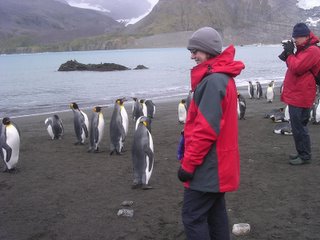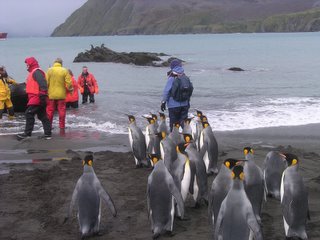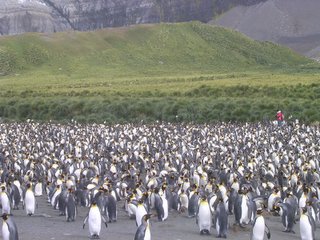Wednesday 9th March; 10th day at sea
When I woke up the ship had anchored in Gold Harbour – our first landing point in South Georgia. I can’t remember getting into calmer water, so I must have been asleep, but once I’d got dressed I went up to the Observation Lounge, immediately above our cabin, expecting to see the whole place reduced to matchwood. Amazingly, it appeared to be completely intact, so I made myself a cup of tea and sat down to admire the scenery; very mountainous, with glaciers coming down the cliffs.
Word started to go around about the hurricane the previous night. The wind had gusted to a maximum of 84 knots (i.e. about 96 mph or 154 kph), the ship had had to tack to make any sort of headway, and the captain was reported as saying that he never wanted to go through anything like that again. One of the yachting wives said that she was mentally working out what she might need if the ship had had to be abandoned, but the thought of being in that weather in an 8 metre life boat with 60 other people, really doesn’t bear thinking about.
When we got ashore at Gold Harbour after breakfast I found out that one of my cameras, the SLR. wasn’t working properly. At first I thought the battery had failed, and I got a lift back to the ship in a zodiac to collect another. Replacing it made no difference, and I noticed that one of the indicator lights in the viewfinder still worked, which meant that the light meter or something connected to it wasn’t working. I eventually worked out that it was the shutter speed indicator that wasn’t working, but even so, I still had problems where there wasn’t very much light.
The highlight at Gold harbour was a colony of King Penguins, some of whom had formed a reception committee. Once we’d got past the usual mass of aggressive Fur Seals, there were quite a few Elephant Seals on the beach, some of whom were sizing up to each other, presumably in an attempt to keep their place in the hierarchy before the mating season, but this was the first time we had seen a large number of nesting penguins in one place. The rookery wasn’t as large as one we saw later in the trip, but compared to what we’d seen before it seemed huge. The was a small hollow, maybe 50-60 metres long that seemed to be full of King Penguins, though strangely, I can’t remember any sounds coming from it; they must have been making a noise though. The other thing I didn’t notice were any chicks; I think there must have been some, judging by a colony we saw elsewhere in South Georgia, but there were none here that I saw. I’ve just checked the expedition log and apparently there were 20,000 pairs here, but I think they can’t all have been where we were.

After the landing, the ship headed north to Grytviken, where we were due to make our second landing. By now the weather had worsened a little and it was overcast and snowing a little. We landed near the old whaling station’s cemetery where Ernest Shackleton is buried, and drank a toast over his grave, and were then free to go around the whaling station site, much of which is cordoned off whilst some tidying up is done, and visit the church and museum. The church has been restored and is used a few times a year; originally it came from Norway in kit form, the station being operated by a Norwegian company. The museum is really very good, with sections on Shackleton, the local wildlife, and the whaling operations. We could really have done with more time here; a whole day would have been better. As this was the first practical place to buy postcards and be able to send them off, we needed to get up to King Edward Point, the local BAS station, where the post office was.
The whaling station is in the process of being almost dismantled. There’s a lot of asbestos around, which the authorities are paranoid about, presumably because they get quite a few American tourists here, and as the buildings are disintegrating, there is a danger from loose sheets of metal. That apart, you did get an idea of how difficult life must have been here for the whalers. As well as a church, there was a rather rocky football pitch and there had been a cinema in the past. The station had been abandoned in the 1960s, but until then must have been a hive of industry.
It was at the Post Office that we first came across Howard Pearce, the Governor of the Falkland Islands and Commissioner for South Georgia and the South Sandwich Islands. We were in the queue to get our cards franked, when he popped his head round the door and asks if anyone could take him over to the ship (meaning the Polar Star). He didn’t get much joy; according to the person running the Post Office, there was no one available to take him over and she was too busy franking postcards (in addition to her day job of base manager). He obviously found someone else to get him across.
In many ways it must be a curious job, or rather jobs, as the Falklands Islands, and South Georgia and the South Sandwich Islands are separate dependencies of the UK. South Georgia in particular is rather odd; there’s no one to govern apart from some itinerant BAS personnel and the two people running the museum, who have been there for about 7 or 8 years, so the government’s activities are mostly to do with regulating fishing and looking after the natural and built environment.
In the evening we had the barbeque on the back deck of the ship; eating outside was optional though a few of the auxiliary captains put their coats and sat down at some tables. Along with the passengers and some of the ship’s officers the staff from King Edward Point were invited and the people running the museum (though they couldn’t come owing to a minor accident). As well as the Governor and his (Dutch) wife, we’re also taking a construction consultant who’s been working on the whaling station at Grytviken and a taxidermist from Essex who’s been working at the museums in Stanley and South Georgia and has been stringing his contract out for as long as possible. Rather odd having a barbeque in snow, but pleasant nonetheless.
Word started to go around about the hurricane the previous night. The wind had gusted to a maximum of 84 knots (i.e. about 96 mph or 154 kph), the ship had had to tack to make any sort of headway, and the captain was reported as saying that he never wanted to go through anything like that again. One of the yachting wives said that she was mentally working out what she might need if the ship had had to be abandoned, but the thought of being in that weather in an 8 metre life boat with 60 other people, really doesn’t bear thinking about.
When we got ashore at Gold Harbour after breakfast I found out that one of my cameras, the SLR. wasn’t working properly. At first I thought the battery had failed, and I got a lift back to the ship in a zodiac to collect another. Replacing it made no difference, and I noticed that one of the indicator lights in the viewfinder still worked, which meant that the light meter or something connected to it wasn’t working. I eventually worked out that it was the shutter speed indicator that wasn’t working, but even so, I still had problems where there wasn’t very much light.
The highlight at Gold harbour was a colony of King Penguins, some of whom had formed a reception committee. Once we’d got past the usual mass of aggressive Fur Seals, there were quite a few Elephant Seals on the beach, some of whom were sizing up to each other, presumably in an attempt to keep their place in the hierarchy before the mating season, but this was the first time we had seen a large number of nesting penguins in one place. The rookery wasn’t as large as one we saw later in the trip, but compared to what we’d seen before it seemed huge. The was a small hollow, maybe 50-60 metres long that seemed to be full of King Penguins, though strangely, I can’t remember any sounds coming from it; they must have been making a noise though. The other thing I didn’t notice were any chicks; I think there must have been some, judging by a colony we saw elsewhere in South Georgia, but there were none here that I saw. I’ve just checked the expedition log and apparently there were 20,000 pairs here, but I think they can’t all have been where we were.
 |  |
| The reception committee at Gold harbour | text 2 |
 |  |
| text 3 | text 4 |

After the landing, the ship headed north to Grytviken, where we were due to make our second landing. By now the weather had worsened a little and it was overcast and snowing a little. We landed near the old whaling station’s cemetery where Ernest Shackleton is buried, and drank a toast over his grave, and were then free to go around the whaling station site, much of which is cordoned off whilst some tidying up is done, and visit the church and museum. The church has been restored and is used a few times a year; originally it came from Norway in kit form, the station being operated by a Norwegian company. The museum is really very good, with sections on Shackleton, the local wildlife, and the whaling operations. We could really have done with more time here; a whole day would have been better. As this was the first practical place to buy postcards and be able to send them off, we needed to get up to King Edward Point, the local BAS station, where the post office was.
The whaling station is in the process of being almost dismantled. There’s a lot of asbestos around, which the authorities are paranoid about, presumably because they get quite a few American tourists here, and as the buildings are disintegrating, there is a danger from loose sheets of metal. That apart, you did get an idea of how difficult life must have been here for the whalers. As well as a church, there was a rather rocky football pitch and there had been a cinema in the past. The station had been abandoned in the 1960s, but until then must have been a hive of industry.
It was at the Post Office that we first came across Howard Pearce, the Governor of the Falkland Islands and Commissioner for South Georgia and the South Sandwich Islands. We were in the queue to get our cards franked, when he popped his head round the door and asks if anyone could take him over to the ship (meaning the Polar Star). He didn’t get much joy; according to the person running the Post Office, there was no one available to take him over and she was too busy franking postcards (in addition to her day job of base manager). He obviously found someone else to get him across.
In many ways it must be a curious job, or rather jobs, as the Falklands Islands, and South Georgia and the South Sandwich Islands are separate dependencies of the UK. South Georgia in particular is rather odd; there’s no one to govern apart from some itinerant BAS personnel and the two people running the museum, who have been there for about 7 or 8 years, so the government’s activities are mostly to do with regulating fishing and looking after the natural and built environment.
In the evening we had the barbeque on the back deck of the ship; eating outside was optional though a few of the auxiliary captains put their coats and sat down at some tables. Along with the passengers and some of the ship’s officers the staff from King Edward Point were invited and the people running the museum (though they couldn’t come owing to a minor accident). As well as the Governor and his (Dutch) wife, we’re also taking a construction consultant who’s been working on the whaling station at Grytviken and a taxidermist from Essex who’s been working at the museums in Stanley and South Georgia and has been stringing his contract out for as long as possible. Rather odd having a barbeque in snow, but pleasant nonetheless.


0 Comments:
Post a Comment
<< Home